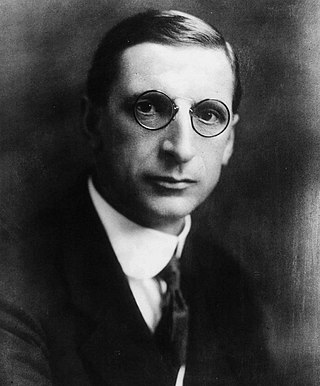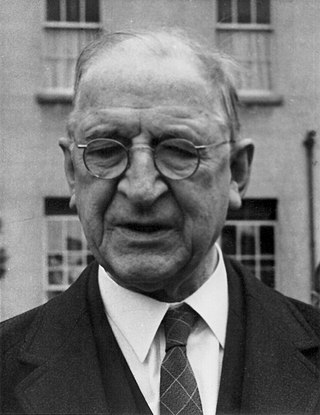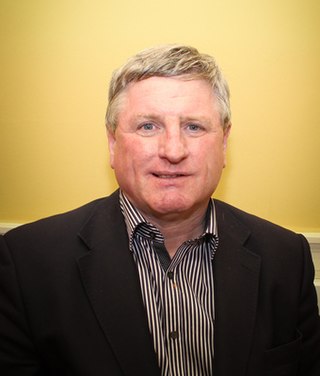Related Research Articles

Ireland is a parliamentary, representative democratic republic and a member state of the European Union. While the head of state is the popularly elected President of Ireland, it is a largely ceremonial position, with real political power being vested in the Taoiseach, who is nominated by the Dáil and is the head of the government.
Sinn Féin is an Irish republican and democratic socialist political party active in both the Republic of Ireland and Northern Ireland.

The Irish component of the 1918 United Kingdom general election took place on 14 December 1918. It was the final United Kingdom general election to be held throughout Ireland, as the next election would happen following Irish independence. It is a key moment in modern Irish history, seeing the overwhelming defeat of the moderate nationalist Irish Parliamentary Party (IPP), which had dominated the Irish political landscape since the 1880s, and a landslide victory for the radical Sinn Féin party. Sinn Féin had never previously stood in a general election, but had won six seats in by-elections in 1917–1918. The party had vowed in its manifesto to establish an independent Irish Republic. In Ulster, however, the Unionist Party was the most successful party.

The 1997 Irish general election to the 28th Dáil was held on Friday, 6 June, following the dissolution of the 27th Dáil on 15 May by President Mary Robinson, on the request of Taoiseach John Bruton. The general election took place in 41 Dáil constituencies throughout Ireland for 166 seats in Dáil Éireann, the house of representatives of the Oireachtas, under a revision in the Electoral (Amendment) Act 1995.

The 1957 Irish general election to the 16th Dáil was held on Tuesday, 5 March, following a dissolution of the 15th Dáil on 12 February by President Seán T. O'Kelly on the request of Taoiseach John A. Costello on 4 February. It was the longest election campaign in the history of the state, spanning 30 days. The general election took place in 40 Dáil constituencies throughout Ireland for 147 seats in Dáil Éireann, the house of representatives of the Oireachtas.

The 2007 Irish general election took place on Thursday, 24 May after the dissolution of the 29th Dáil by the President on 30 April, at the request of the Taoiseach. The general election took place in 43 parliamentary constituencies throughout Ireland for 166 seats in Dáil Éireann, the lower house of parliament, with a revision of constituencies since the last election under the Electoral (Amendment) Act 2005. The outgoing Fianna Fáil–Progressive Democrat administration was returned, joined by the Green Party and supported by some independents, giving a government majority of 9.

The September 1927 Irish general election to the 6th Dáil was held on Thursday, 15 September, following the dissolution of the 5th Dáil on 25 August by Governor-General Tim Healy on the request of President of the Executive Council W. T. Cosgrave.

The 2011 Irish general election took place on Friday 25 February to elect 166 Teachtaí Dála across 43 constituencies to Dáil Éireann, the lower house of Ireland's parliament, the Oireachtas. The Dáil was dissolved and the general election called by President Mary McAleese on 1 February, at the request of Taoiseach Brian Cowen. The 31st Dáil met on 9 March 2011 to nominate a Taoiseach and approve the new ministers of the 29th government of Ireland, a Fine Gael and Labour Party coalition government with a majority of 58.

Pearse Daniel Doherty is an Irish Sinn Féin politician who has been a Teachta Dála (TD) for the Donegal constituency since the 2016 general election, and previously a TD for the Donegal South-West constituency from 2010 to 2016. He also previously served as a Senator for the Agricultural Panel from 2007 to 2010.
This is a summary of the results of general elections to Dáil Éireann, the house of representatives of the Oireachtas, the Irish Parliament, from 1918 to the present. With the exception of 1918, they were held using the electoral system of proportional representation by means of the single transferable vote.

The 2016 Irish general election to the 32nd Dáil was held on Friday 26 February, following the dissolution of the 31st Dáil by President Michael D. Higgins on 3 February, at the request of Taoiseach Enda Kenny. The general election took place in 40 Dáil constituencies throughout Ireland to elect to elect 158 Teachtaí Dála to Dáil Éireann, the house of representatives of the Oireachtas. There was a reduction of eight seats under the Electoral (Amendment) Act 2013. Fine Gael were returned to government as a minority administration.
The 31st Dáil was elected at the 2011 general election on 25 February 2011 and first met at midday on 9 March 2011 in Leinster House. The members of Dáil Éireann, the house of representatives of the Oireachtas (legislature) of Ireland, are known as TDs. It sat with the 24th Seanad as the two Houses of the Oireachtas.
The financing of federal political entities in Canada is regulated under the Canada Elections Act. A combination of public and private funds finances the activities of these entities during and outside of elections.

An election to all 39 seats on Galway County Council took place on 23 May 2014 as part of the 2014 Irish local elections, an increase from 30 seats at the 2009 election. County Galway was divided into 5 local electoral areas (LEAs) to elect councillors for a five-year term of office on the electoral system of proportional representation by means of the single transferable vote (PR-STV). In addition, the town councils of Ballinasloe, Loughrea and Tuam were all abolished.

An election to all 19 seats on Offaly County Council took place on 23 May 2014 as part of the 2014 Irish local elections, a decrease from 21 seats at the 2009 election. County Offaly was divided into three local electoral areas (LEAs) to elect councillors for a five-year term of office on the electoral system of proportional representation by means of the single transferable vote (PR-STV). In addition, the town councils of Birr, Edenderry and Tullamore were all abolished.

A by-election was held in the Dáil Éireann Carlow–Kilkenny constituency in Ireland on Friday, 22 May 2015, to fill the vacancy left by the resignation of Fine Gael Teachta Dála (TD) Phil Hogan on his appointment as European Commissioner. It was held on the same day as national referendums on marriage equality and the age of eligibility for election to the office of president. The Electoral (Amendment) Act 2011 stipulates that a by-election in Ireland must be held within six months of a vacancy occurring. The by-election writ was moved in the Dáil on 29 April 2015.
Patrick McKee is an Irish former politician. He is a member of Fianna Fáil, and was formerly a member of Renua and was their candidate in the 2015 Carlow-Kilkenny Dáil by-election.

The 2020 Irish general election took place on Saturday 8 February, to elect the 33rd Dáil, the lower house of Ireland's parliament. The election was called following the dissolution of the 32nd Dáil by the president, at the request of the Taoiseach, Leo Varadkar, on 14 January 2020. The members, Teachtaí Dála (TDs), were elected by single transferable vote in multi-seat constituencies. It was the first election since 1918 to be held on a weekend. Following the election, Fine Gael and Fianna Fáil entered into a historic coalition government.

The 2024 Irish general election to elect the 34th Dáil took place on Friday, 29 November 2024, following the dissolution of the 33rd Dáil on 8 November by President Michael D. Higgins at the request of Taoiseach Simon Harris. Polls were open from 7 a.m. to 10 p.m UTC. It elected 174 Teachtaí Dála (TDs) across 43 constituencies of between 3 and 5 seats to Dáil Éireann, the lower house of the Oireachtas, Ireland's legislature. Under the Electoral (Amendment) Act 2023, the number of TDs was increased from 160 to 174, with an increase in the number of constituencies from 39 to 43. The 34th Dáil will be the largest Dáil in the history of the state. The main issues in the campaign were the cost of living, housing affordability and availability, immigration and asylum management, and economic stability amid external trade uncertainties, reflecting voter concerns despite the country's strong overall financial health.
References
Citations
- ↑ pp. 260, 261.
- ↑ "Electoral Act 1997". electronic Irish Statute Book (eISB). Part III. Retrieved 13 February 2020.
- ↑ Leogue, Joe (11 June 2019). "Renua will continue to collect €250k despite having no elected representatives". Irish Examiner. Retrieved 13 February 2020.
- ↑ Augustenborg, Cara (19 February 2016). "This election is make or break for the Green Party". Irish Independent. Retrieved 13 February 2020.; Conroy, Ben (23 January 2020). "Vote Aontú and keep pro-life politics alive". The Irish Catholic. Retrieved 13 February 2020.
- ↑ Murphy, Ronan J. and Farrell, David M.: 'Party Politics in Ireland: Regularizing a Volatile System', in: Paul Webb, David Farrell and Ian Holliday (eds.): Political Parties in Advanced Industrial Democracies, Oxford: Oxford University Press, 2002, pp. 230-31.
- ↑ Questions 20, 24.
- ↑ McMenamin, Iain: Business Financing of Politics in Ireland - Theory, Evidence and Reform, Working Papers in International Studies No. 12/2011, p. 9.
- ↑ Question 19.
- ↑ p. 271.
- ↑ Nassmacher, Karl-Heinz: The Funding of Party Competition. Political Finance in 25 Democracies, Baden-Baden: Nomos, 2009, pp.77-78, 80-82.
- ↑ p. 275.
- ↑ Doyle, Avril (8 July 1992). "Private Business. - Funding of Political Parties and Candidates: Motion". Seanad Éireann (19th Seanad) debates. Houses of the Oireachtas. Retrieved 4 December 2019.
- ↑ Redmond v Minister for the Environment [2001] IEHC 128 , [2001] 4 I.R. 61; "Electoral (Amendment) Bill, 2002: Second Stage". Dáil Éireann (28th Dáil) debates. Oireachtas. 21 March 2002. Retrieved 4 December 2019.
- ↑ Reidy, Theresa (25 May 2019). "Surpluses and tallies: This is the dummy's guide to an election count". Independent.ie. Retrieved 4 December 2019.
Counting of votes is also operated to help candidates and the rules are designed where possible to [aid] candidates getting back their election deposits and being eligible to be reimbursed for their election expenses.
- ↑ "Presidential elections in Ireland". Citizens Information Board. 1 November 2018. Retrieved 4 December 2019.
- ↑ Stuart-Mills, Ian (2017). "European Elections". Department of Housing, Planning and Local Government. Retrieved 4 December 2019.; "S.I. No. 122/1999 - European Parliament Election (Reimbursement of Expenses) Regulations, 1999". electronic Irish Statute Book. p. §3(b)(i). Retrieved 4 December 2019.
The amount of election expenses which may be reimbursed to a candidate under these Regulations shall be the actual expenses incurred by the candidate or thirty thousand pounds whichever is the less
; Standards in Public Office Commission (March 2019). "Guidelines for the European Parliament Election of 24 May 2019 [Candidates and Election Agents]" (PDF). p. 17 §1.8.2. Retrieved 4 December 2019. - ↑ "Election Expenses". Citizens Information Board. 12 August 2013. Retrieved 4 December 2019.
- ↑ Stuart-Mills, Ian (2018). "Local Elections". Department of Housing, Planning and Local Government. Retrieved 4 December 2019.
- ↑ Questions 1, 2.
- ↑ Questions 9, 10.
- ↑ Question 14, 18.
- ↑ Subsection (4B)(a) of section 17 of the Electoral Act of 1997 as inserted by no. 42 of the Electoral (Amendment)(Political Funding) Act 2012.
- ↑ GRECO Evaluation Report on Ireland, Transparency of Party Funding (Theme II), 2009, p. 8.
- ↑ See http://www.sipo.gov.ie/en/Reports/Annual/Disclosure%5B%5D; the whole paragraph is taken from: http://www.idea.int/publications/funding-of-political-parties-and-election-campaigns/upload/foppec-p8.pdf, pp. 272-3, 296.
- ↑ pp. 277, 280.
- ↑ GRECO report 2009, p. 25.
Sources
- Farrell, David M.: 'Ireland', in: Party Organizations. A Data Handbook on Party Organizations in Western Democracies, 1960-90, London et al.: Sage Publications, 1992, pp. 389–457.
- Farrell, David M.: 'Ireland: Centralization, Professionalization and Competitive Pressures', in: Katz, Richard S./ Mair, Peter (eds.): How Partiers Organize. Change and Adaptation in Party Organizations in Western Democracies, London et al.: Sage Publications, 1994, pp. 216–241.
- McMenamin, Iain: Business Financing of Politics in Ireland - Theory, Evidence and Reform, Working Papers in International Studies No. 12/2011. Centre for International Studies, Dublin City University.
- Murphy, Ronan J. and Farrell, David M.: 'Party Politics in Ireland: Regularizing a Volatile System', in: Paul Webb, David Farrell and Ian Holliday (eds.): Political Parties in Advanced Industrial Democracies, Oxford: Oxford University Press, 2002, pp. 217–47.
- O'Dowd, John: 'Ireland', in: Grant, Thomas D. (ed.): Lobbying, Government Relations and Campaign Finance. Navigating the Laws, Regulations and Practices if National Regimes, Oxford: Oceana Publications, 2005, pp. 201–260.